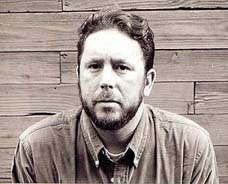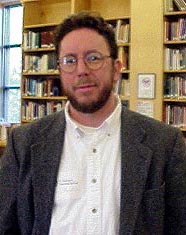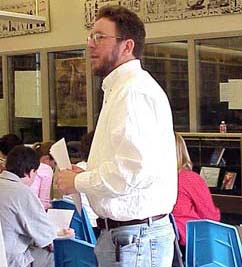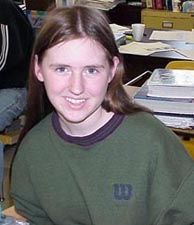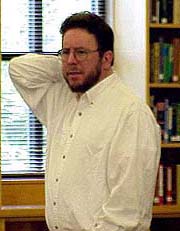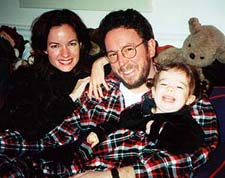Major Works
- The Tilted World, novel co-authored with his wife Beth Ann Fennelly (2013)
- Crooked Letter, Crooked Letter (2010)
- Smonk: A Novel (2006)
- Hell at the Breech (2003)
- Poachers: Stories (1999)
- The Alumni Grill: Anthology of Southern Writers Vol II (edited by Tom Franklin and Beth Ann Fennelly)
Biography of Tom Franklin
by Amber Breland (SHS)
Thomas Gerald Franklin was born in the small southern town of Dickinson, Alabama, on July 7, 1963. In 1981 he moved with his family to Mobile, Alabama, and later attended the University of South Alabama in Mobile where he earned his BA in English. While attending the University of South Alabama, Tom Franklin worked nights at various places. He was employed as a heavy equipment operator at a sandblasting grit factory, a construction inspector in a chemical plant, a clerk at a hospital morgue, and he also worked at hazardous waste clean-up sites. After graduating from the University of South Alabama, Tom Franklin earned his MFA in fiction at the University of Arkansas in 1998.
One year later Tom Franklin returned to the University of South Alabama to teach. The fall of the same year he became the Phillip Roth Resident in Creative Writing at Bucknell University in Lewisburg, Pennsylvania. Next, he moved to Knox College, where he held the position of visiting Writer-in-Residence. In 2000, Tom Franklin moved to Oxford, Mississippi, as the John and Renee Grisham Writer-in-Residence at Ole Miss. While there, he instructed both undergraduate and graduate students in a two semester fiction writing course. He and his wife BethAnn Fennelly maintain a house in Oxford where she is a member of the English Department. Winner of a 2001 Guggenheim
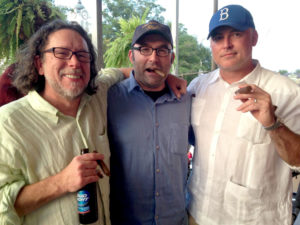
Authors Tom Franklin, William Boyle, and Ace Atkins. Photo courtesy of Ace Atkins (2018)
Fellowship, Franklin taught at Sewannee during the academic year 2002-2003.
As a writer, Tom Franklin has found great success. His short stories and essays have been published in numerous magazines including The Chattahoochee Review, Brightleaf, The Nebraska Review, The Texas Review, Quarterly West, and Smoke Magazine, to name a few. His writings have also been included in anthologies such as New Stories from the South; The Year’s Best, 1999; Best American Mystery Stories, 1999 and 2000; and Best Mystery Stories of the Century.
Franklin has published one book to date (See UPDATE below) called Poachers: Stories, published in 1999 by William Morrow and Company. It is a collection of ten short stories set in Alabama. The title story was recognized with the Edgar Allan Poe Award for Best Mystery Story. Poachers is to be published in British, French, Japanese, and German versions. Currently, Franklin is working on a second book called Hell at the Breech, which is to be published by Harper Collins. Like Poachers, Hell at the Breech is set in Alabama, this time in Clarke County, Tom Franklin’s childhood home. The story focuses on a feud which occurred in 1899.
In addition to the Edgar Allan Poe award, Franklin has been honored several times for his literary achievements. In July of 1998, he won the Writers at Work Literary Nonfiction Contest. He received the Arkansas Arts Council grant for the short story in August of 1998. He was also presented with a 2001 Guggenheim Fellowship and, of course, the John and Renee Grisham Writer-in-Residence for the 2001- 2002 academic year.
Franklin and his wife, poet Beth Ann Fennelly, have one daughter, Claire.(See update below) As a poet, Fennelly published her first book, Open House, which received the 2001 Kenyon Review Prize in Poetry for a first book, an award which is one of the country’s most prestigious awards for a new author. She is also the recipient of the 1997 Texas Review Poetry Chapbook Competition. Previously an assistant professor of English at Knox College in Galesburg, Illinois, Beth Ann Fennelly is currently at the University of Mississippi as a visiting poetry and literary studies professor. (See update below.)
UPDATE
Franklin’s work, Hell at the Breech, a novel based somewhat on events Franklin heard about growing up in Alabama, was published in May of 2003. Tom Franklin continues to teach as Associate Professor of Fiction Writing in the University of Mississippi’s MFA program. Tom Franklin and his wife Beth Ann Fennelly (she now directs the MFA Program at the University of Mississippi ) now have three children.
His third novel Smonk was published in 2006. It is a violent and savage tale of a murdering rapist who has terrorized the small town of Old Texas, Alabama, for years and his trial in 1911. In 2010 Franklin published his third novel entitled Crooked Letter, Crooked Letter, which won the Los Angeles Times Book Prize and the Crime Writers’ Association’s Gold Dagger Award. The Tilted World, published in 2013, is a novel co-authored with his wife Beth Ann Fennelly.
Reviews
A Review of Poachers: Stories (2002)
by Amber Breland (SHS)
Tom Franklin’s Poachers: stories is a collection of ten eye-opening tales set in the modern South in Alabama. The stories address the injustice and irony that life can sometimes have as well as the corruption present in daily life. Franklin puts his characters in situations where temptation makes the line between right and wrong unclear at times.
In “Introduction-Hunting Years,” the author discusses the pressure on children to conform to local heritage and tradition and the suppression of originality. Tom Franklin recalls the horror and panic he experienced time and again as he took to the woods in the fall. He also elaborates about the uncivilized rituals which followed his first successful hunt.
The story “Alaska” shows the desperation felt by a man who feels as if he is being suffocated by his normal life. He is looking for an escape, and he dreams of spontaneously getting in his truck and driving all the way to Alaska. He even goes so far as to imagine the people he will encounter and the situations he will experience in painstaking detail. Although he realizes that this idea is in itself out of the question, it gives him motivation to keep on going in life, even if he never gets anywhere.
The story “Poachers” is a tale of the three Gates brothers who live off of the land and the people in a dying town. After tragedy left the three boys alone in the world, save for a family friend, the boys find ultimate retribution after alluding the laws of man and taking up those of nature.
Another of the tales Tom Franklin includes in the book was most likely drawn from his personal experiences as a heavy equipment operator at a sandblasting grit factory. The story “Grit” takes place in just such a plant, with a few twists. It is a story of struggle, not necessarily between good and evil, but there is definitely a conflict. Although neither party are on the right side of the law, this story takes the reader round and round in circles as two men, Roy and Glen, find themselves as allies and enemies.
All of the stories found in Poachers convey a similar message of how the Old South is taking its final gasps as the new, modern South takes charge in the lives of the most ordinary men. Despite the fact that the fight for dominance is over, the old wounds have yet to heal, making for anything but the relaxing, quiet life most commonly linked to the South.
Although the stories in Poachers use a significant amount of language some readers would deem offensive, the language is used tactfully, creating verisimilitude in Tom Franklin’s stories. Some of the stories also contain situations that may be offensive to readers. Although these things can sometimes be distracting to a reader, in the case of Tom Franklin’s writings, if one can look beyond the harsh words on the surface, the reader will finish the book with the satisfaction of having read a valuable piece of literature. The fact that this work is the author’s first work, along with the acclaim it has received from the literary community, makes the idea of more tales like those contained in the pages of Poachers appealing.
Interview with Tom Franklin (2002)
by Amber Breland (SHS)
Tuesday, December 17, 2002
My name is Amber Breland, and I am a junior at Starkville High School. I am currently working on a project about you for the Mississippi Writers and Musicians Web Page. The page consists of a biographies, book reviews, and related sites about various authors who were born or live in the state. I would greatly appreciate it if you could answer a few questions for an interview which will also be posted on the page.
Amber, my pleasure. Sorry to take a while to respond. Have been finishing copy edits on novel and finishing teaching.
Here’s my first question. When were you born? Where?
1963, Dickinson, Alabama, tiny town population say 300
Who is your favorite author/authors? What is your favorite book?
I loved Stephen King and Edgar Rice Burroughs as a kid. Now it’s Barry Hannah, Rick Bass, Cormac McCarthy. Favorite book? Rick Bass’s The Watch. Barry Hannah’s Airships. McCarthy’s Suttree.
What author do you think has influenced you the most and why?
Rick Bass, probably. His stories in The Watch opened my eyes to what good writing could do. The way he imagined things was so real, so full, so vital. His images breathed.
When did you become interested in writing? Was there something in particular that got you interested in writing?
I always loved imagining things. As a kid, playing with G. I. Joes and imagining their lives. Building sci-fi forts from cardboard boxes and bricks, drawing control panels on the walls, etc. I liked creating the forts more than I did playing in them. There was something wonderful about making something tangible, something others could see, participate in.
Then I moved to drawing my own comic books. I loved comic books–Marvel, DC. I collected them and had a couple of thousand of them. I drew one sci-fi comic book (a rip-off of Space 1999 and BattleStar Galactica) that numbered up to like 24 or 25. I was serious about it. Then I started writing barbarian stories. I loved Tarzan and Conan the Barbarian and so wrote a lot of bad imitations of those.
What do you like most about writing?
Being finished. For me, writing isn’t fun. It’s lonely and I don’t enjoy sitting by myself trying to make something up. Once in a while, a story will write itself, or a character will do something that surprises me as it’s happening, but not so often.
What kind of student were you in high school?
A “C” student. Instead of reading Romeo and Juliet, I was reading Stephen King. I hated math, failed algebra twice.
I recently read your book, Poachers, the series of short stories set in Alabama. Since you previously worked in a sandblasting grit factory, what other experiences did you draw from to write the stories?
To write a story, you have to get the details right. You have to convince a reader you know what you’re talking about. So growing up in a hunting environment, as I did, I’m able now to write about poachers. Working in a sandblasting factory, as I did, for four years, I’m able to set a story there and make the setting believable.
I especially enjoyed the story Poachers, although it is fiction, were any of the characters based on actual people?
Yep, the three brothers are based on the the Wiggins brothers I mention in the book’s introduction. These guys were amazing and fluid in their surroundings. They could catch any fish, kill any deer. They were like mountain men to me. I envied how at ease they seemed, where I felt alien in my childhood.
Of all the stories in Poachers, Introduction – Hunting Years seemed to be the most believable. Was any part of the story based on real events?
It’s an essay, so it’s true.
Although one of your stories does directly address what common man considers poaching, all of the stories in Poachers concern poaching in other interpretations of the word. How did you decide to focus on this theme?
Oddly, I didn’t realize that poaching was the theme until the stories–as a collection– were nearly done. I thought the main theme was contamination, how we’re screwing up our environment. The book was originally going to be called “Don’t Touch the Ground,” after a story that we took out.
I heard that you are working on a new book, Hell at the Breech, which is about a feud in 1899 in Clarke County, Alabama, near where you grew up. Where did you get the idea for the book and can you elaborate on the story any?
I’d always heard this story, and when my agent was getting ready to sell my collection, he said he needed an novel idea. So I sent him a couple, and he said no, they weren’t right. Did I have something violent? He said I did violence well.
Do you have any advice for aspiring writers?
Read the good stuff. Stephen King once called his writing the literary equivalent of a Big Mac and fries. Read good, healthy stuff. Read the Best American Short Stories anthology each year. New Stories from the South. Flannery O’Connor. Faulkner. Hemingway.
Has Mississippi or living in Mississippi influenced your writing?
Only in that it’s a lovely place to live. A calm place. And a lot of writers come through so it’s enriching in that way.
I am aware that your wife, Beth Ann Fennelly is a poet. How is it to work beside another writer?
Excellent. Every fiction writer needs a poet to tighten his or her lines. BA is my first, best reader and an amazing writer. In fact, she just sold her second book to W. W. Norton.
Thank you. I am looking forward to learning more about your career. I thoroughly enjoyed reading your book, and I am looking forward to Hell at the Breech; I believe that I have found yet another author whom I will enjoy following throughout his career.
Related Websites
- Tom Franklin’s faculty web site at Ole Miss.
- Interview with Franklin on Amazon.com about Crooked Letter, Crooked Letter.
- Author of Hell at the Breech talks with Robert Birnbaum, July 31, 2003.
- Harper Collins Reading Guide for Hell at the Breech.
- Read an article about Tom Franklin’s future after his stint at Grisham writer-in-residence at Ole Miss in 2002. (Article is out of date.)
- Kay Kimbrough reviews Tom Franklin’s Poachers.
Bibliography
- Beth Ann Fennelly and Tom Franklin.” 6 Nov. 2000 6 Dec. 2002. <http://www.nd.edu/%Eisla/ISLA/webpages/thearts/creativewriting.htm>.
- Franklin, Tom. “Poachers: stories.” New York: William Morrow and Company, Inc, 1999.
- Jahrami Designs. “Tom Franklin.” 6 Dec. 2002<http://www.know.edu/engdept/tomfranklin/bio.html>.
- “Reviews.” 8 Dec. 2002 <http://www.amazon.co.uk/exec/obidos/tg/s…s/0006552269/
reviews/202-0299180-2705469>. - “Tom Franklin, Grisham writer-in-residence at Ole Miss, ends year with new novel.” 17 Jun. 2002 6 Dec. 2002.
- Tom Franklin’s Reading. 26 Feb.. 2002 12 Dec. 2002 <http://lfa.atu.edu/english/tom_franklin_reading.htm>.

